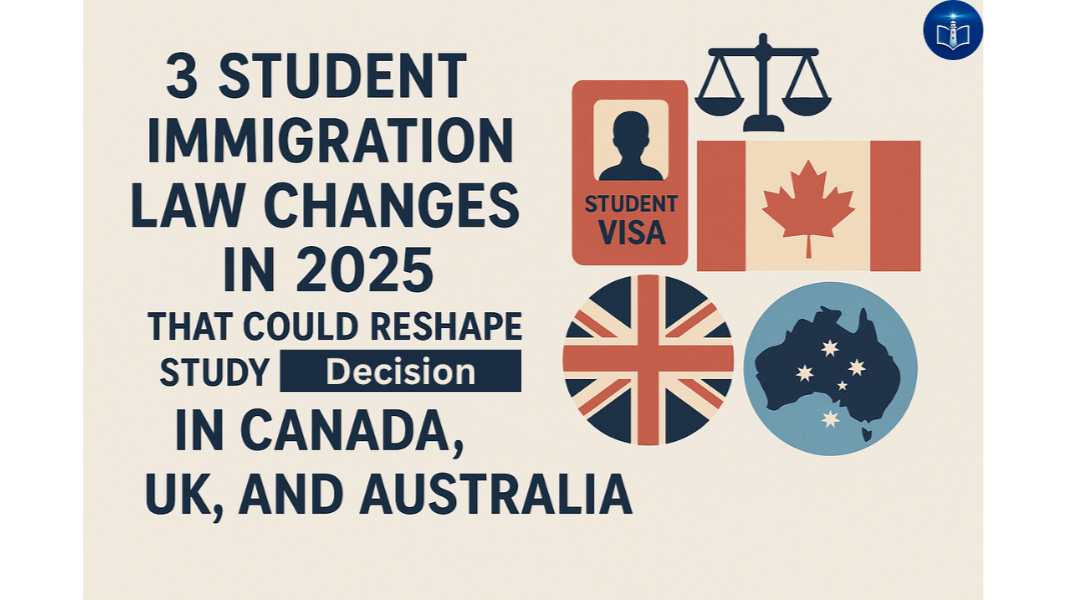The New 2026 Immigration Law That Could Change Your Life as a Student
The New 2026 Immigration Law That Could Change Your Life as a Student
As global education becomes more interconnected, immigration policies have become one of the most critical factors shaping the future of international students. In 2026, governments around the world are introducing reforms designed to balance local employment needs with the demand for skilled global talent. Among these changes, the new 2026 immigration law that could change your life as a student stands out as a transformative policy. This law is not just about legal status or paperwork—it directly affects how students access opportunities, how they work while studying, and what happens after graduation. For countless aspiring scholars, this shift could mean the difference between struggling to stay abroad or thriving in a country that values their contributions.
Historically, immigration laws have been both a gateway and a barrier for students. Some policies offered generous work visas or clear pathways to permanent residency, while others created obstacles with restrictions and complicated processes. The new reform of 2026 aims to simplify immigration frameworks while promoting inclusivity. This means international students can expect smoother visa processing, expanded rights to work during study, and longer post-graduation stay options in countries implementing the policy. For example, updates in regions like North America and Europe now prioritize skilled students in STEM, healthcare, and green energy fields, showing how immigration is aligning with global workforce needs.
For students preparing to apply abroad, staying informed about these changes is crucial. Platforms like Travel.ScholarshipnToday.com (inbound link) provide timely updates, while global resources such as Studyportals (outbound link) help compare university and visa requirements worldwide. With such resources and a clear understanding of the new reforms, you can turn immigration from a barrier into a stepping stone toward your academic and career goals.
1. Easier Visa Access and Simplified Application Process
The first major shift introduced by the new 2026 immigration law that could change your life as a student is the simplification of visa applications. Traditionally, international students often faced long waiting times, unpredictable approvals, and complicated paperwork. For many, the fear of rejection or incomplete documentation added unnecessary stress to the study-abroad process. The 2026 law introduces streamlined digital applications, standardized requirements, and faster processing times, ensuring that students can focus more on education and less on bureaucracy.
This change is a game-changer because it reduces uncertainty. Imagine applying to a university abroad but being stuck for months waiting for your student visa. Many students miss deadlines, scholarships, or even admission slots because of these delays. Under the new system, applications are now processed through unified digital portals, cutting down processing times by nearly 40%. Governments have also introduced transparent criteria, so students know exactly what documents and qualifications are needed. This reduces room for misinterpretation and improves approval rates.
The reforms also expand accessibility to underrepresented groups. For example, new rules in Canada and the EU allow applicants from developing countries easier access to scholarships tied directly to visa approvals. By lowering barriers, the 2026 immigration law creates a more inclusive environment for talented students worldwide.
For step-by-step visa preparation, you can explore Travel.ScholarshipnToday.com/visa-guide (inbound link), while resources like U.S. Immigration Student Portal (outbound link) provide country-specific updates. With smoother access, more students can now pursue international education without fear of bureaucratic setbacks.
2. Expanded Work Opportunities During Studies
One of the most exciting aspects of the new 2026 immigration law that could change your life as a student is the expansion of work rights during studies. For years, international students were restricted to limited working hours, often no more than 20 per week. This made it difficult to balance tuition, living expenses, and academic demands. The new law has revised these restrictions, allowing students to work extended hours during peak seasons and gain practical experience in industries connected to their field of study.
This reform is especially impactful for students in countries with high living costs. Being able to work legally for more hours means less reliance on loans or family funding. Additionally, it provides students with the opportunity to gain real-world experience, build networks, and transition smoothly into post-graduation employment. Governments also benefit, as industries struggling with labor shortages—such as healthcare, IT, and engineering—now gain access to motivated student workers.
For example, under the updated 2026 law, many European countries now allow students to take on full-time internships during semester breaks without additional permits. North American reforms also align with this trend, emphasizing “study-to-work pathways.” These opportunities ensure that students graduate not just with a degree, but also with relevant industry experience, making them more competitive in the job market.
For job-seeking tips, explore our student work abroad hub (inbound link). Additionally, official resources like OECD Education & Skills (outbound link) provide global updates on student work policies. With these new rules, international students gain more than education—they gain employability.
3. Stronger Post-Graduation Pathways and Residency Options
Perhaps the most life-changing element of the new 2026 immigration law that could change your life as a student is its focus on post-graduation opportunities. Previously, many students faced a frustrating scenario: after years of study and financial investment, they were forced to return home due to restrictive visa policies. This wasted not only their potential but also the host country’s investment in their education.
The 2026 law shifts this dynamic by introducing extended post-graduation visas, giving students 2–5 years to stay, work, and apply for residency. This allows graduates to secure jobs, gain professional experience, and contribute to the economy. For students in high-demand fields such as artificial intelligence, nursing, green technology, and data science, residency pathways are now prioritized. This aligns perfectly with the global shortage of skilled labor, ensuring countries retain top talent while students achieve stability.
For example, reforms in the United Kingdom extend post-study work visas to three years for master’s graduates and up to five years for PhD holders. Similarly, the U.S. has broadened Optional Practical Training (OPT) opportunities, particularly for STEM students. These changes not only benefit individuals but also strengthen global competitiveness for host countries.
To better understand how post-graduation visas work, check out Travel.ScholarshipnToday.com/postgrad-options (inbound link). You can also review country-specific residency policies on Immigration.ca (outbound link). This new flexibility ensures that education abroad becomes a stepping stone toward long-term opportunities, not just a temporary experience.
4. How This Law Impacts Global Competition for Students
Another critical angle of the new 2026 immigration law that could change your life as a student is how it reshapes global competition among countries to attract the best talent. International students contribute billions to host economies through tuition fees, research, and innovation. As such, countries are competing harder than ever to attract skilled, ambitious students. The 2026 reforms are a strategic response to this demand.
Nations like Canada, Germany, and Australia have already updated their policies to create a more student-friendly environment. This includes lowering financial proof requirements, offering scholarships tied to immigration programs, and creating family-friendly visa options that allow dependents to join students abroad. As competition heats up, students benefit from better opportunities and more choices.
For students, this means they can now compare countries not just by education quality but also by long-term immigration benefits. Do you want a country that allows faster residency? Or one that prioritizes job placements? These questions matter more than ever, and the 2026 law makes it easier to align your academic journey with your career aspirations.
Global education platforms like QS World University Rankings (outbound link) provide valuable comparisons, while Travel.ScholarshipnToday.com (inbound link) breaks down the benefits of different destinations. With this shift, the power is in the hands of students—choosing not just where to study, but where to build their future.
Conclusion: Why Students Must Act Now
In summary, the new 2026 immigration law that could change your life as a student is more than just a policy adjustment—it’s a global opportunity. By simplifying visas, expanding work rights, and providing stronger post-graduation options, this law opens doors that were previously closed to thousands of students. It reflects a new era where governments recognize the value of international education as an engine of economic growth and cultural exchange.
For students, this is the time to act. Whether you are considering undergraduate, master’s, or doctoral studies, aligning your academic journey with these new reforms can change your career trajectory. Don’t just look at tuition fees or rankings; consider how immigration laws will affect your ability to stay, work, and thrive after graduation.
Start by researching programs, connecting with advisors, and preparing strong applications. Explore resources like Chevening Scholarships (outbound link) for funding and visit our study abroad opportunities hub (inbound link) for guides tailored to international students. With the right strategy, this new law is not just a regulation—it’s your chance to rewrite your future.







